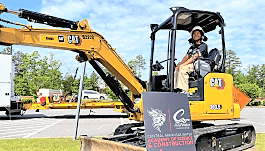Central Arkansas Water constructing new kind of pipeline for developing future workforce
June 8, 2023

AWWA Articles
Central Arkansas Water constructing new kind of pipeline for developing future workforce
High school students in Pulaski County in Arkansas, which includes Little Rock, are on the cusp of a unique program that creates a pipeline without lifting a shovel.
 The county’s four school districts are utilizing the Ford Next Generation Learning model to help guide students through the process of planning for careers after high school or college, including a career in the water sector. The initiative is called The Academies of Central Arkansas.
The county’s four school districts are utilizing the Ford Next Generation Learning model to help guide students through the process of planning for careers after high school or college, including a career in the water sector. The initiative is called The Academies of Central Arkansas.
In short, each high school in the county is offering classes to help students gain hands-on experience and knowledge for careers in agriculture, business, aerospace, healthcare and water.
Central Arkansas Water (CAW) has partnered with Maumelle High School, in a town of about 10,000 residents northwest of Little Rock, to create the Central Arkansas Water Academy of Science & Construction. (Pictured above, a student tests an excavator at a kickoff event for the Central Arkansas Water Academy of Science & Construction.)
Students who graduate from the program will receive their licensure as a water operator.
 “It just gets them on a career path the minute they graduate high school into a career that ultimately they could stay with their entire life,” said Doug Shackelford, CAW’s director of public affairs and communications.
“It just gets them on a career path the minute they graduate high school into a career that ultimately they could stay with their entire life,” said Doug Shackelford, CAW’s director of public affairs and communications.
“We see this program not just as a benefit to CAW, but as a benefit for utilities all over the state,” said Tad Bohannon, CEO of CAW. “The other way we look at it is giving high school graduates an opportunity to stay in the local community and have a good high-paying job with good benefits, where in the past, some of those kids may have left the community.”
The program, which begins in mid-August, has 40 high school students, including 37 freshmen, enrolled. The kids will be immersed in water-related education.
“The idea is that the curriculum runs all the way around,” explained Bohannon. “Your history teacher may talk about water history. In geometry, you’ll learn how to figure out the volume of a water pipe and how many gallons of water will it hold. The problems even that they’re working at through their courses will be related back to the water industry.”
It isn’t all water all the time, though. Students will have the opportunity to participate in extra-curricular activities offered at Maumelle High School.
The teachers for the program are certified. They’re not former water employees. In fact, the teacher who will educate students enrolled in the water academy will work at CAW this summer to learn about the industry. At first, CAW will send employees to co-teach the program, but the plan is for that to wane as the teachers become more familiar with the industry.
The teachers won’t be the only ones working at CAW over the summer. A requirement of passing Arkansas’ licensure test is six months of working in the industry. Students will spend two summers working at CAW to accrue the hours required to fulfill this portion of the certification.
 At the very least, Bohannon and Shackelford hope to gain local ambassadors for the water sector who can offer first-hand knowledge of the reasons behind topics such as potential rate hikes or boil orders.
At the very least, Bohannon and Shackelford hope to gain local ambassadors for the water sector who can offer first-hand knowledge of the reasons behind topics such as potential rate hikes or boil orders.
“The best advertising we can get is the word of mouth from someone who is not us,” said Shackelford. “If someone else is speaking on our behalf, the value of that from an advertising perspective is immense.”
Bohannon sees the program potentially launching new competition or showcase opportunities at future AWWA events.
“I’m kind of challenging folks to have high school divisions of Meter Madness and Hydrant Hysteria,” he said. “Other states that have programs like this, let’s all put together high school teams to do these competitions. Let’s take them all to ACE and show them the industry at that level and let them do demonstrations or compete against each other. There’s a real opportunity to take this out of the classroom and then take it into the industry itself. That could really bolster attracting people to this environment.”
Advertisement